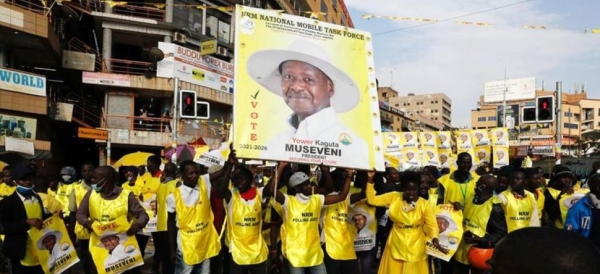Uganda shows that there are elections, and there are elections
While you were looking at riots in Washington…
You may have missed, unless you are a resident of that country, that one week ago there have been general elections in Uganda.

This post only starts from the Uganda 2021 elections
All I know about the Uganda 2021 elections is what I read on Wikipedia, in the article from which I got the screenshots for this post, and in a couple other links that I will mention in a minute.
This post is only about something that is visible if you look at those elections, but it is relevant for everybody, Ugandans or not, wherever they live.
Uganda
Yesterday I found on LinkedIn a post calling the Uganda 2021 Election a “Textbook Case of Disruption to Democracy and Digital Networks”. This is the backstory:
- Uganda’s 2021 election happened after “disrupted internet, rampant disinformation campaigns… protesters shot dead, and the media and civil society profoundly harassed”
- The blockage of social media and other digital platforms dealt a heavy blow to opposition candidates' efforts to canvass support [because Uganda was] conducting a so-called “scientific election”, one where the media and digital platforms “provide the main campaign platforms… due to Covid-19 social distancing protocols”
- In December 2020, the Uganda Communication Commission asked Google to block 14 YouTube channels that “were misleading the public and inciting violence”, even if it is through the same channels that “repeated cases of blatant police and army brutality were documented and reported”
And here comes the interesting part:
“Google declined to consider the blockage request since it was not accompanied by a court order."
This, in December 2020. Less than one month later, that is right after January 6th in Washington, Trump was banned by Twitter and Facebook, without court orders, or anything but CEOs orders, in fact.
One week after those bans, Facebook and Twitter suspended “the accounts of a number of ugandan government officials and NRM party officials”, for “manipulating public debate ahead of key elections”.
Different countries, different reactions
For the explanations given by Twitter and Facebook, and to know more about how “over the years, Uganda has made it a habit to disrupt communications during elections”, see the LinkedIn piece. This post, as I said, is about something else. It is only about, as discussed here by BBC, “what has changed, and when” (emphasis mine):
"First we saw US President Donald Trump banned from Twitter and Facebook and now that has been extended beyond the US to Africa."
“Mark Zuckerberg has long insisted that the platform he founded has to allow all forms of free speech and cannot become an arbiter of political conversations."
“So what has changed? The truth is that [it is only] … the violence and chaos witnessed at the heart of the US government in recent days [that] forced Facebook to… make some pretty big decisions."
THIS is what you need to remember about the Uganda 2021 elections
Personally, I think that this is not the first time that Mark Zuckerberg tries to push “business as usual”, while being as powerless as Prof. Falken. And I have already written that the way Trump, my own Prime Minister and too many of their colleagues use social media needs a serious, but very simple reboot. But what you really want to remember from the Uganda 2021 elections, wherever you live, is these two things:
- Election campaigns and government actions worldwide depend every year more on digital communication
- The communication of those campaigns and actions, in every country, depends on if and how similar, or similarly serious events are already happened, or not, in just one country
I have no solutions for this (except this partial, but extremely simple one, or course). But this is something that definitely needs more discussion.
Who writes this, why, and how to help
I am Marco Fioretti, tech writer and aspiring polymath doing human-digital research and popularization.
I do it because YOUR civil rights and the quality of YOUR life depend every year more on how software is used AROUND you.
To this end, I have already shared more than a million words on this blog, without any paywall or user tracking, and am sharing the next million through a newsletter, also without any paywall.
The more direct support I get, the more I can continue to inform for free parents, teachers, decision makers, and everybody else who should know more stuff like this. You can support me with paid subscriptions to my newsletter, donations via PayPal (mfioretti@nexaima.net) or LiberaPay, or in any of the other ways listed here.THANKS for your support!